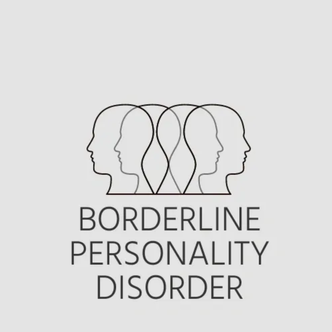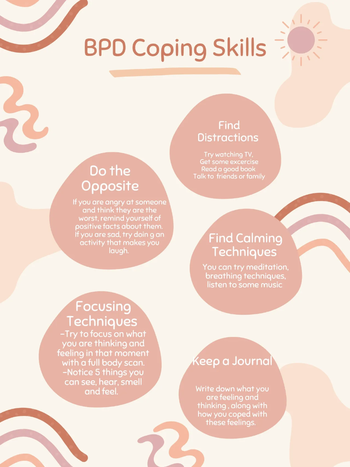|
Do you have a person in your life who seems to go from zero to a hundred? Someone who, you could be talking to one moment and in the next it’s like a flip as switched, and they are in a rage, screaming at you to leave their life, to crying, begging you not to leave them. Their emotions control them, they are hypersensitive, easily hurt, or worried over things you might see as small mundane things. Maybe you brought flowers home for your spouse, just because you were thinking about them, but to them it meant you had done something to earn suspicion. Maybe you are this person? Feeling like your friends and family are going to leave you forever, scared they don’t actually like you or that you will be left alone. Maybe these fears take over, make you lash out, frantic to ensure that those who you hold close will not ever leave you. It makes sense to leave them before they can leave you, breaking up with relationships or not answering messages, isolating yourself as a pre-emptive measure to avoid the wave of pain. A gift on a random Monday means that something bad has happened to earn your distrust. If you recognize these symptoms in yourself or a loved one, you may have Borderline Personality Disorder (BPD). Borderline Personality Disorder is a personality disorder characterized by instability and volatility in personal relationships, emotional sensitivity and dysregulation leading to intense bouts of mood swings. Someone with BPD might also experience feelings of emptiness and a poor self-image, which can lead to things such as changing their appearance through plastic surgery, food constriction, hair dye and more in an effort to improve the way they and others see themselves. Many experience a debilitating fear of abandonment from those around them, causing them to lash out at any sign of separation. In the face of this fear, many will engage in emotionally volatile behaviours and actions that cause those around them to walk away, feeding into this fear and to an extent, manifesting it. Additionally, people with BPD are at a higher probability of engaging in self harming behaviours, such as high risk sexual activities, substance abuse, suicide or self-sustained injury to the body without the intention of suicide. This can include actions such as cutting, purposefully burning oneself using a cigarette or stove, scratching or stabbing oneself with a sharp object. Another sign of BPD is Splitting. Splitting is a phenomenon when someone with BPD has all or nothing thinking or attitude as a reaction to an uncomfortable or difficult situation. Often it can seem like two people are in one body holding opposing viewpoints, unable to integrate both lines of thinking together; someone can be good, or someone can be bad, there is no middle ground about that person-that someone might be both good and bad. For an individual close to someone with BPD, you may go from being the best person they have ever met, they never want to leave your side to the worse person in their life, they hate you, want you out of their life forever and never want to see or talk to you again. They are unable to reconcile you as both someone who did something to hurt them as well as someone who loved them. BPD may present in someone for a number of reasons. There might be a genetic component, so if someone in your family has borderline, then there is a higher chance of another member developing BPD. This is not however a guarantee that a if a parent has BPD, their child will also have it. BPD may also come from a variation in the brain, as people with BPD have been shown to have a smaller amygdala- the area important for emotion, the hippocampus-important for behavioural regulation and self-control. Research so far has shown that the primary reason for the development of BPD is people’s childhood. A majority of people with BPD have experienced some form of childhood abuse or trauma such as separation, neglect, physical or sexual abuse. However, there are also many people who did not experience traumatizing childhoods, rather may have had happy and caring childhoods, who then go on to develop BPD and people who have experienced trauma who do not go on to develop BPD.
There are a number of different types of therapy someone with BPD might benefit from- schema therapy, where you work to recognize why you might have problematic coping mechanisms and then try to change behaviours; transference focused psychotherapy, focusing on building self-image and better behaviours, or Mentalization-based therapy, which works long term to teach you how to focus on your thoughts as well as others, and how they influence your behaviours and actions. There is no medication which can be taken to help with BPD, however there are a variety of medications which can be taken to help reduce some of the symptoms such as depression, anxiety, psychosis etc. It can be extremely difficult to have BPD, and it can also be extremely difficult to live with someone with BPD. Family members should work to try to understand the mind of someone with BPD, and may benefit from receiving therapy of their own. AuthorWritten by Alisha Khanduja
0 Comments
Leave a Reply. |
Archives
March 2023
Categories
All
|
- Home
- Who We Serve
- About
-
Services
- Child Therapy Burlington Ontario
- Adolescent Counselling Burlington Ontario
- Burlington Adult Therapy
- Parent Therapy Burlington Ontario
- Burlington Family Counselling
- Burlington Individual Therapy
- Couples Therapy Burlington
- Mental Health Therapy Burlington
- Burlington Anxiety Therapy
- Depression Therapy Burlington Ontario
- Burlington PTSD Counselling
- Burlington ADHD Therapy Services
- Borderline Personality Disorder Therapy Burlington
- Milton Psychotherapy Services
- Child Therapy Milton Ontario
- Adult Therapy Milton ON
- Milton Family Counselling
- Couples Therapy Milton Ontario
- Mental Health Therapy Milton
- Walk and Talk Therapy
- EMDR Therapy
- Contact
- Book Now
- Blog



 RSS Feed
RSS Feed
